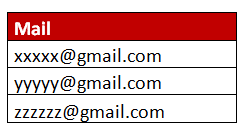Our email verification service is one of the few services worldwide that complies with the new GDPR regulation of the European Union. In this article you will discover why working with Verify Emails is the best option to ensure compliance with the new European data protection regulation.
What is GDPR
The GDPR (General Data Protection Regulation) is the European Union’s new data protection reform. It aims to bring together under a single regulation, the different regulations of the EU countries and clearly define the privacy rights of EU citizens, regardless of who processes their data. The new regulation aims to give citizens greater control over their data. As of May 25, they will have to give their explicit permission for any kind of data collection and processing. At the same time, it obliges companies to have greater control over the data collected, establishing greater control and security measures for their storage and use. At this point you may be wondering how the implementation of GDPR affects a service such as email verification. The verification service “processes” personal data of individuals, some of whom are EU citizens, so we must follow EU regulations.
GDPR and email verification
At Verify Emails we take the protection of our users’ data very seriously, that’s why we have our email verification service used:
- The servers that perform the data processing are physically located in the European Union, so there is no need for any international transfer of data.
- All data uploaded to Verify Emails is encrypted to ensure an optimal level of security.
- Communication with our application is protected by encryption using https communication throughout our website.
- Verify Emails has a real-time API to validate emails without the need to store any personal data on our servers.
- At any time the data can be removed from the verification platform by deleting any copies of the data. The end user has full control over the uploaded and processed data.
- At the contractual level, the ownership of the data and the access to it by the VerificarEmails team is defined.
If we analyze other email verification services, we will see that the vast majority are outside the Eurozone, so that when dumping the data, companies are incurring in an international transfer of data and in some cases between countries or companies not adhered to the Privacy Shield. Our recommendation is that before hiring any email verification or data enrichment service you make sure that the chosen company is up to date with international agreements on data protection and especially the GDPR.
Best practices when verifying emails
A good practice is that if we only want to validate emails, we upload to the system the addresses we want to validate. If the file contains extra fields, such as name, surname or more private information such as sexual orientation, medical data, religion… do not upload these data to any service. Once we finish validating them, we can attach them back to the validated file. Example of a file with level 3 data according to the current Spanish legislation.
If instead of this file, we only upload the e-mail addresses, the file we process is only level 1 according to the current Spanish legislation.
Once validated, we will get something like this
With Excel, we can paste columns containing personal data such as first name, last name, gender, religion and sexual orientation. With this simple procedure we greatly reduce the risk of using third party services and ensure the integrity of our data. For those companies where data processing is a priority, at VerificarEmails we have developed an even more sophisticated solution. It consists of using the API in real time. In this case the data is not stored in VerificarEmails, eliminating the transfer of data and only the result of the verification is returned in real time. Over the next few weeks we will be expanding this article explaining how the new data enrichment services fit within the new GDPR legal framework. For those of you who have not yet tried the email verification service, remember that you can evaluate it for free by registering at VerifyEmail.





